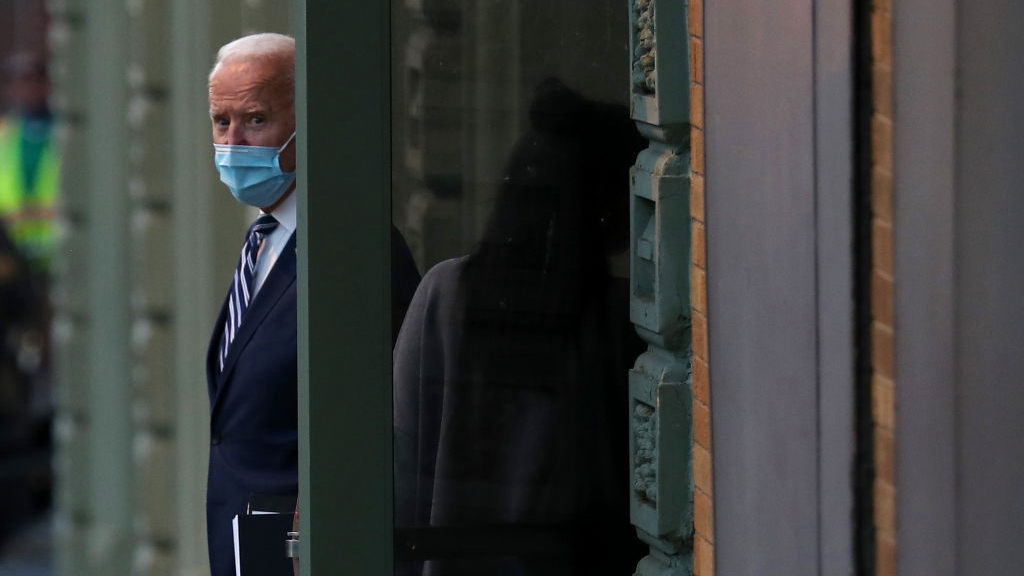
U.S. projected winner Joe Biden leaves the Queen Theater in Wilmington, Delaware, November 10, 2020. /Getty
U.S. projected winner Joe Biden leaves the Queen Theater in Wilmington, Delaware, November 10, 2020. /Getty
Editor's note: Yannan Collins is a consultant with a media background and qualifications based in the United States. The article reflects the author's opinions, and not necessarily the views of CGTN.
After a prolonged and messy election, Joe Biden edged out Donald Trump, becoming the projected winner of the United States presidency. While the smoothness of the transition is still in question as the Trump campaign is contesting the election process, the economic data indicates Biden will face an uphill battle in the economic recovery.
According to the U.S. Bureau of Labor Statistics, in October the unemployment rate dropped to 6.9 percent and 638,000 jobs were created. It seems like the market is continuing its recovery, but the improvement has plateaued.
New jobs created stayed at around 600,000, while well over one million workers lost their jobs; millions of jobs have been permanently lost. Hiring is slowing down and lay-offs are still very much present. It's safe to say the easiest part of the economic recovery is over.
The first phase of economic recovery seems easy because this recession is unequal. Over 70 million people lost jobs temporarily in March but lots of them were expected to go back to their jobs – most of that process already happened.
Among people who went back, most are educated high paying workers who have access to technologies and privileges to work from home. Low-wage workers, those who work in restaurants, theme parks or movie theaters, have no job to go back to. Compare to the six percent unemployment rate of white Americans, the unemployment rate of African Americans is still over 10 percent.
The reason behind this disparity is the COVID-19 pandemic, people being not confident or comfortable dining out, watching movies or traveling. Therefore, containing the virus has to come before the rest of the economic recovery.
This correlation is evidenced in other major economies: countries that have contained the pandemic early, namely China and South Korea, have shaken off the effects of the pandemic and returned to economic growth. Countries that have taken moderate containing measures, such as Germany, still suffer a slight decline but are overall stable. Countries that have given up, such as the U.S., are suffering the most decline.
Trump did not set Biden for success in terms of containing COVID-19. Days before the election, White House Chief of Staff Mark Meadows made clear that the federal government is "not going to control" the pandemic. Days later, daily COVID-19 cases in the U.S. spiked to over 100,000, reaching the threshold of 10 million total cases. Under this new wave and with Trump's pandemic response, or lack of such, the pandemic will most likely be worse before Biden's inauguration.

A supporter of President Donald Trump unfurls a U.S. flag in Philadelphia, Pennsylvania, November 10, 2020. /Getty
A supporter of President Donald Trump unfurls a U.S. flag in Philadelphia, Pennsylvania, November 10, 2020. /Getty
Moreover, about one-third of jobless Americans are now long-term unemployed, according to the Economic Policy Institute. Even though Biden can implement an active response to control the pandemic right after his inauguration, the hopelessness is much harder to undo.
After the Great Recession, the process of getting the people who left the labor force back into work was barely complete at the beginning of 2020. It is harder for people who have been out of a job for more than six months to find employment.
Trump also has ruined a stable international environment, which could accelerate America's post-pandemic economic recovery. Since Roosevelt, every president believed that the U.S. should build, lead and engage in an open and rule-based international community. Since the U.S. is still the single most powerful economy, it will benefit the most from a stable international environment.
Trump, however, inversed this long-term strategy by abrading international partners and withdrawing from international organizations, most of which were initiated by the U.S.
Furthermore, Trump is scaling back on America's international leadership in a time of change. The U.S., for the first time in a long time, is facing a real competitor – China. China is second only to the U.S. and is bigger than the next four economies combined. Meanwhile, more countries in Africa and Asia are gaining political confidence and cultural pride after the West has been dominating the world for too long; no single country can boss around the others anymore.
The U.S. today has to show more leadership to earn respect from the rest of the world. Trump eroded the international order more dramatically than any president in modern times.
This leaves the rest of the world to wonder: is this the new America? Or will things be back to "normal" once Biden takes office? Trump indeed represents something – the nationalism and protectionism among some Americans. Also, Trump and his followers are not going anywhere after Biden becomes president. Inevitably, the U.S. now is considered neither dependable nor predictable.
If Biden wants to utilize the international infrastructure to aid the economic recovery, he will need to not only fix relationships with traditional partners but also establish a new relationship with China and other rising countries.
The easy part of the recovery is over; the historical challenge has yet to come.
(If you want to contribute and have specific expertise, please contact us at opinions@cgtn.com)

